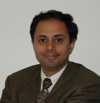Nelson Cardiovascular Research Lecture
- Department of Physiology
- About Physiology and Biophysics
-
Education
- Melissa and Pete Shepherd, Jr., PhD New Investigator Prize
- Physiology and Biophysics Educational Programs Home
- Graduate Program
- Undergraduate Research Experience
- Seminar and Lecture Series
- Seminar Series Archives
-
Research
- 2026 Publications
- 2025 Publications
- Physiology and Biophysics Research Home
- Core Facilities
- Programs
- Graduate Program Research
- Publications
- Research Links
- Resources
Sanjiv Gambhir, MD, PhD
Tuesday, March 12, 2002
University of Mississippi Medical Center, Room R153

Sanjiv Sam Gambhir is director of the Crump Institute for Molecular Imaging and an associate professor in the Departments of Molecular and Medical Pharmacology and Biomathematics at the UCLA School of Medicine. Dr. Gambhir is also attending in nuclear medicine at the UCLA School of Medicine and the UCLA Center for Health Sciences.
Dr. Gambhir received his BS in physics in 1983 and then entered the UCLA Medical Scientist Training Program and received his MD and PhD degrees in 1993. He subsequently trained in medicine and nuclear medicine at the UCLA Center for Health Sciences.
Dr. Gambhir has built a laboratory focused on molecular imaging in living subjects over the last seven years. This laboratory uses technologies such as micro positron emission tomography (microPET), micro computerized axial tomography (microCAT), digital whole-body autoradiography (DWBA) and optical imaging with charged-coupled device (CCD) cameras.
The laboratory focuses on merging advances in molecular biology with those in biomedical imaging to advance the new field of molecular imaging. Methods to image gene expression in living subjects have been developed as well as methods to image molecular switches in mice. Newer approaches to image fundamental cellular events with various optical and radiolabeled probes are under active investigation. These imaging approaches are expected to have a fundamental impact in the study of cancer biology as well as in molecular therapeutics including gene therapy.
Dr. Gambhir currently has 19 graduate students and post-doctoral fellows in his molecular imaging laboratory. He also directs the activities of over 80 faculty, students and staff at the Crump Institute for Molecular Imaging.
He has received several awards including the Frontiers of Science Lectureship at the U.S. National Academy of Sciences, U.S. Department of Energy Alexander Hollaender Fellowship and the UCLA Gold Medal Outstanding Graduate Student Award. He is currently funded from the National Cancer Institute, Department of Energy and Department of Defense as well as several private foundations.


